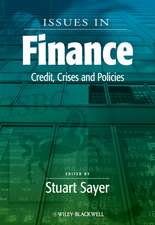Bargaining in a Video Experiment: Determinants of Boundedly Rational Behavior: Lecture Notes in Economics and Mathematical Systems, cartea 467
Autor Heike Hennig-Schmidten Limba Engleză Paperback – 17 feb 1999
Din seria Lecture Notes in Economics and Mathematical Systems
-
 Preț: 360.02 lei
Preț: 360.02 lei -
 Preț: 383.93 lei
Preț: 383.93 lei -
 Preț: 384.09 lei
Preț: 384.09 lei -
 Preț: 380.07 lei
Preț: 380.07 lei -
 Preț: 446.26 lei
Preț: 446.26 lei -
 Preț: 497.37 lei
Preț: 497.37 lei -
 Preț: 380.84 lei
Preț: 380.84 lei -
 Preț: 384.86 lei
Preț: 384.86 lei -
 Preț: 378.34 lei
Preț: 378.34 lei -
 Preț: 399.67 lei
Preț: 399.67 lei - 20%
 Preț: 360.93 lei
Preț: 360.93 lei - 15%
 Preț: 643.16 lei
Preț: 643.16 lei -
 Preț: 379.09 lei
Preț: 379.09 lei -
 Preț: 404.74 lei
Preț: 404.74 lei -
 Preț: 385.62 lei
Preț: 385.62 lei - 15%
 Preț: 644.49 lei
Preț: 644.49 lei -
 Preț: 379.09 lei
Preț: 379.09 lei -
 Preț: 345.50 lei
Preț: 345.50 lei -
 Preț: 425.80 lei
Preț: 425.80 lei -
 Preț: 378.34 lei
Preț: 378.34 lei - 18%
 Preț: 775.65 lei
Preț: 775.65 lei -
 Preț: 392.60 lei
Preț: 392.60 lei -
 Preț: 401.61 lei
Preț: 401.61 lei - 15%
 Preț: 646.43 lei
Preț: 646.43 lei -
 Preț: 382.18 lei
Preț: 382.18 lei -
 Preț: 378.34 lei
Preț: 378.34 lei - 15%
 Preț: 637.59 lei
Preț: 637.59 lei - 15%
 Preț: 647.27 lei
Preț: 647.27 lei -
 Preț: 377.73 lei
Preț: 377.73 lei -
 Preț: 447.84 lei
Preț: 447.84 lei - 15%
 Preț: 644.49 lei
Preț: 644.49 lei -
 Preț: 386.00 lei
Preț: 386.00 lei - 15%
 Preț: 654.43 lei
Preț: 654.43 lei -
 Preț: 415.02 lei
Preț: 415.02 lei -
 Preț: 411.54 lei
Preț: 411.54 lei -
 Preț: 398.92 lei
Preț: 398.92 lei -
 Preț: 398.92 lei
Preț: 398.92 lei -
 Preț: 392.75 lei
Preț: 392.75 lei - 15%
 Preț: 635.47 lei
Preț: 635.47 lei - 20%
 Preț: 653.56 lei
Preț: 653.56 lei -
 Preț: 379.86 lei
Preț: 379.86 lei -
 Preț: 495.46 lei
Preț: 495.46 lei -
 Preț: 447.99 lei
Preț: 447.99 lei -
 Preț: 378.71 lei
Preț: 378.71 lei - 15%
 Preț: 637.13 lei
Preț: 637.13 lei -
 Preț: 385.84 lei
Preț: 385.84 lei -
 Preț: 378.54 lei
Preț: 378.54 lei - 15%
 Preț: 666.55 lei
Preț: 666.55 lei -
 Preț: 380.07 lei
Preț: 380.07 lei
Preț: 385.08 lei
Nou
Puncte Express: 578
Preț estimativ în valută:
73.69€ • 77.09$ • 61.21£
73.69€ • 77.09$ • 61.21£
Carte tipărită la comandă
Livrare economică 03-17 aprilie
Preluare comenzi: 021 569.72.76
Specificații
ISBN-13: 9783540654155
ISBN-10: 3540654151
Pagini: 244
Ilustrații: XII, 221 p.
Dimensiuni: 155 x 235 x 13 mm
Greutate: 0.35 kg
Ediția:Softcover reprint of the original 1st ed. 1999
Editura: Springer Berlin, Heidelberg
Colecția Springer
Seria Lecture Notes in Economics and Mathematical Systems
Locul publicării:Berlin, Heidelberg, Germany
ISBN-10: 3540654151
Pagini: 244
Ilustrații: XII, 221 p.
Dimensiuni: 155 x 235 x 13 mm
Greutate: 0.35 kg
Ediția:Softcover reprint of the original 1st ed. 1999
Editura: Springer Berlin, Heidelberg
Colecția Springer
Seria Lecture Notes in Economics and Mathematical Systems
Locul publicării:Berlin, Heidelberg, Germany
Public țintă
ResearchCuprins
Content.- 1 Introduction.- 2 Description of the Experiment.- 2.1 Experimental Design.- 2.2 Organizational Features.- 3 Data and Evaluation.- 3.1 Experimental Setup.- 3.2 Evaluation.- 4 Determinants of Boundedly Rational Behavior.- 4.1 Aspiration Levels.- 4.2 Prominence.- 4.3 The Equity Principle and Fairness.- 4.4 Motivations, Emotions, and Social Norms.- 5 Analysis of Payoffs and Proposals.- 5.1 Bargaining Models and Related Experiments.- 5.2 Payoffs.- 5.3 Proposals.- 5.4 Threats.- 5.5 Strategic Ideas.- 5.6 Conclusion.- 6 Equity and Prominence in Aspiration Levels and Proposals.- 6.1 The Equity Principle and Fairness.- 6.2 Prominence.- 6.3 Aspiration Levels.- 6.4 Proposals.- 6.5 The Negotiation Agreement Area - Comparison of Results.- 6.6 Other Aspiration Level Based Approaches Explaining Outcomes of Bargaining.- 6.7 Conclusion.- 7 Break Offs.- 7.1 Correlates of Break Off Discussions.- 7.2 Monetary and Nonmonetary Motives.- 7.3 Motivations.- 7.4 Reciprocity, a Social Norm with Two Faces.- 7.5 Emotions.- 7.6 Motivational Explanation of Potential and Actual Break Offs.- 7.7 Conclusion.- 8 Conclusive Remarks: How Do Business People Decide?.- Appendices 137.- A Introduction of Experimental Subjects.- B Negotiation Processes.- C Negotiation Processes of the Kuon-Uhlich-Experiment.- D Allocations.- E Formation and Adaptation of Aspiration Levels.- F Break Off Discussions.- G Questionnaire for Business People.- References.
Caracteristici
Includes supplementary material: sn.pub/extras














